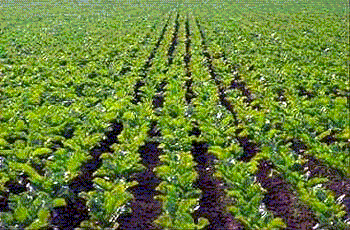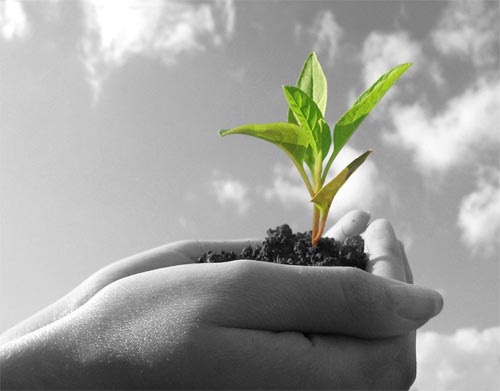Growing Organic Agriculture from Eastern Europe to Central Asia
- Ayrıntılar
- Üst Kategori: ROOT
- Kategori: Environment Writings
UNEP Green Economy Initiative Assesses Role of Sustainable Agriculture in Boosting Exports, Livelihoods and Jobs Across the Region - The potential to create a booming organic agriculture sector across Eastern Europe, the Caucasus and Central Asia is the focus of a study announced today by the UN Environment Programme (UNEP).
Geneva, 12 April 2010

UNEP is partnering with the International Federation of Organic Agriculture Movements (IFOAM) to examine the economic, employment, poverty reduction and environmental benefits that could be achieved through greater investment in sustainable agriculture in the Eastern Europe, Caucasus and Central Asia (EECCA) region.
This latest Green Economy Initiative project, being conducted at the request of environment ministers of the UN Economic Commission for Europe region, will include a sub-regional analysis and national studies in Ukraine, Armenia and Moldova.
National workshops will be organised in the three countries to consult a broad range of stakeholders, and the first forum in Armenia will be held tomorrow (13 April).
The study, funded by the Government of Sweden, will build on the findings of a 2007 report on sustainable consumption by UNEP and the European Environment Agency which concluded that the EECCA region's low use of synthetic fertilisers and pesticides, and its availability of workers presented good prospects for the growth and export of organic food products to Western Europe.

According to the IFOAM, organic agriculture worldwide is developing rapidly with 35 million hectares of agricultural land managed organically by almost 1.4 million producers in over 150 countries, and the European Union is one of the world's largest and fastest growing markets for organics.
Yet the share of organic farmland in Ukraine and Moldova is less than 1%, while sustainable farming is just beginning in Armenia.
Achim Steiner, UN Under-Secretary-General and UNEP Executive Director, said: "Organic agriculture can trigger sharply polarized views, sometimes presented as the anti-dote to modern, intensive agriculture systems or cast as a niche, luxury market for the few and the rich.
"But there is increasing evidence from Africa and elsewhere that organic agriculture can play its part in feeding the world and in meeting various sustainability goals, from water and improved soil quality to delivering higher levels of employment and conservation of biodiversity," he said.
"Several countries in Eastern Europe, the Caucasus and Central Asia are already producing organic produce and are part of one of the world's growth industries. This new initiative aims to assist in catalyzing more countries to take part and to increase the hectares of organic production in a region keenly looking for sustainable, Green Economy choices," added Mr Steiner.
The project will also aim to increase awareness of the benefits of organic agriculture and its growth potential in the region and develop more political support for national organic agriculture programmes, the Executive Director of IFOAM, Markus Arbenz, said.
"The UN's Green Economy Initiative is fully aligned with IFOAM's objectives of working with national governments to increase the uptake of the multi-functional benefits of organic production and marketing practices and systems," Mr Arbenz said.
"In EECCA countries in particular, organic farming has not been widely supported by government policy or certification schemes, yet it presents significant opportunities. We welcome the opportunity to strategically develop the sector in the region and deliver environmental and social benefits to the local people," Mr Arbenz said.
To ensure national ownership and build capacity in the EECCA region, the research and background data will be prepared by national institutions and experts in conjunction with UNEP and IFOAM.
Each national project in Ukraine, Armenia and Moldova will develop a package of policy reforms, investments and capacity building measures for fostering a transition to a Green Economy dominated by investment in, and consumption of, sustainable goods and services from the agriculture sector.
A final report is due to be issued in late 2010.
Notes to Editors:
Workshop dates for the scoping study include:
- Ukraine - 6 April, Ukraine's National Academy of Science, Kiev
- Armenia - 13 April, Golden Tulip Hotel, Erevan
- Moldova - 5 May, Ministry of Agriculture and Food Industry, Chisinau
Outlook for organic agriculture
The 2007 report issued by UNEP and the European Environment Agency is entitled Sustainable consumption and production in South East Europe and Eastern Europe, Caucasus and Central Asia. Amongst other findings, it concluded that there were many promising opportunities for the EECCA region to embrace sustainable consumption and production and "leapfrog", or avoid, some of the consumption related problems common in Western Europe.
You can find this report at: /eea.europa.eu/publications/eea_report_2007_3
The latest data contained in the IFOAM publication, The World of Organic Agriculture 2010, shows that the highest share of agricultural land allocated to organic agriculture in Europe is in Liechtenstein (29.82%), Austria (15.87%) and Switzerland (11.08%).
In comparison, according to the IFOAM. the share of organic farmland in Ukraine is 0.65%; Moldova 0.47%; and Russian Federation (0.02%).
The World of Organic Agriculture: Statistics and Emerging Trends 2010, presented by the Swiss-based Research Institute of Organic Agriculture and the International Federation of Organic Agriculture Movements (IFOAM), estimates that in 2008, 35 million hectares of agricultural land were certified according to organic standard, up from around 32 million hectares in 2007: an increase of nine per cent.
An estimated 34% of this is in Oceania with Australia having 12 million hectares; followed by Europe and Latin America with 23% share respectively of total land under organic production.
Eight countries world-wide-Australia, Argentina, China, the United States of America, Brazil, Spain, India and Italy- now have one million or more hectares of land under organic cultivation.
The six countries or territories with the highest increase in land converted or in the process of being converted to organic agriculture between 2007 and 2008 are Argentina, up 1.2 million hectares; the Falkland Islands, up 414,000 hectares; Spain, up 325,000 hectares; China, up 300,000 hectares; the United States, up 185,000 and Kazakhstan, up 85,000 hectares.
There are nearly 1.4 million organic producers world-wide led by India, 340,000; Uganda, 181,000; Mexico, 129,000; Ethiopia, 102,000; Tanzania, 85,000 and Peru, 46,000.
The report also looks at the growth of wild collection of foods including bee keeping. It estimates that, in 2008, over 31 million hectares were devoted to these harvesting activities led by Finland with close to eight million hectares managed this way followed by Brazil; just over six million; Zambia, over five million and India, close to three million.
The report says more and more countries and territories are providing data on organic agriculture with new countries including Burundi; the Comoros islands; French Guiana; Lesotho; Oman; Sierra Leone; Tajikistan and Zimbabwe.
A separate report by the UK-based organization Organic Monitor, also issued this year, estimates the organic food and drink market was worth close to $51 billion in 2008 with the market having grown by 235 per cent since 1999.
Currently the main growth markets for organic products are Europe and the United States where, it is claimed, consumers are becoming increasingly interested in 'chemically-clean products' and the environmental impact of foods and drinks.
See also a chart prepared by UNEP/GRID Arendal showing the surface area by country of organic farming in Europe (including some countries involved in the new study) based on IFOAM 2007 data:
http://maps.grida.no/go/graphic/organic-farming-in-europe-surface-area-by-country
A 2008 report released by UNEP and the UN Conference on Trade and Development analyzed 114 small-scale farms in 24 African countries. It found that yields had more than doubled where organic, or near-organic practices had been used. That increase in yield jumped to 128 per cent in east Africa.
The study found that organic practices outperformed traditional methods and chemical-intensive conventional farming. It also found strong environmental benefits such as improved soil fertility, better retention of water and resistance to drought.
Green Economy Initiative
Led by UNEP, the Green Economy Initiative (GEI) of the UN is designed to assist governments in "greening" their economies by reshaping and refocusing policies, investments and spending towards a range of sectors, such as clean technologies, renewable energies, water services, green transport, waste management and sustainable agriculture and forests.
As the governments around the world are devising responses to the challenges posed by financial, economic, food, fuel and climate crises, the GEI offers convincing macroeconomic evidence and technical advice for focusing policy and investment packages on key economic sectors as a means of stimulating economic development, creating jobs and addressing poverty, while reducing greenhouse gas emissions, extracting and using less natural resources and creating less waste.
See: www.unep.org/greeneconomy
International Federation of Organic Agriculture Movements (IFOAM)
IFOAM is the umbrella organization for the international organic movement. IFOAM's goal is the worldwide adoption of ecologically, socially and economically sound systems based on the principles of Organic Agriculture.
Organic Agriculture is a production system that sustains the health of soils, ecosystems and people. It relies on ecological processes, biodiversity and cycles adapted to local conditions, rather than the use of inputs with adverse effects. Organic agriculture combines tradition, innovation and science to benefit the shared environment and promote fair relationships and a good quality of life for all involved.
New, more sustainable agricultural systems offer competitive economic returns, the supply of essential and life-supporting ecosystem services, the creation of jobs and livelihoods, a smaller ecological footprint, increased resilience to climate change and enhanced food security.
See: www.ifoam.org
For more information, please contact:
UNEP
Nick Nuttall, UNEP Spokesperson and Head of Media, +41 795 965 737 or +254 733632755, or Bu e-Posta adresi istenmeyen posta engelleyicileri tarafından korunuyor. Görüntülemek için JavaScript etkinleştirilmelidir.
Julie Marks, UNEP Regional Office for Europe, +41 22 917 84 04 or Bu e-Posta adresi istenmeyen posta engelleyicileri tarafından korunuyor. Görüntülemek için JavaScript etkinleştirilmelidir.
IFOAM
Markus Arbenz, Executive Director, +49 160 804 15 57 or Bu e-Posta adresi istenmeyen posta engelleyicileri tarafından korunuyor. Görüntülemek için JavaScript etkinleştirilmelidir.
http://www.unep.org/Documents.Multilingual/Default.asp?DocumentID=620&ArticleID=6528&l=en&t=long









